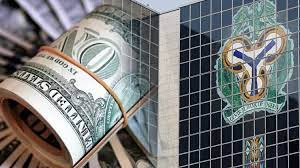Amid its fresh moves to stabilise the nation’s volatile exchange rate, the Central Bank of Nigeria has ordered Deposit Money Banks to sell their excess dollar stock latest February 1, 2024.
The CBN, which made the disclosure in a new circular released on Wednesday, also warned lenders against hoarding excess foreign currencies for profit.
According to officials, the central bank believes some commercial banks hold long-term foreign exchange positions to enable them profit from the volatile movements of exchange rates.
The new circular introduces a set of guidelines aimed at reducing the risks associated with these practices.
In the circular titled, “Harmonisation of Reporting Requirements on Foreign Currency Exposures of Banks”, the CBN raised concerns over the growing trend of banks holding large foreign currency positions.
The latest circular came barely 48 hours after the CBN released a circular, warning banks and FX dealers against reporting false exchange rates, among others.
The new development also came on the heels of the adjustment of the methodology used for the calculation of the nation’s official exchange rate by the FMDQ Exchange.
The review has pushed the Nigerian Autonomous Foreign Exchange Market rate (official exchange rate) from approximately N900/dollar to N1,480/dollar. The naira closed at 1,450/dollar at the parallel market on Tuesday.
The move which is aimed at unifying the official and parallel market exchange rates has been hailed by economists and other stakeholders.
They, however, challenged the CBN to clear FX backlogs estimated at over $5bn and also fund FX demands at the official market. This, they said, would forestall a situation whereby the parallel market rate would move away from the official rate again.
Apparently as part of the moves to fund FX request at the official window, the CBN in its latest circular released on Wednesday accused banks of holding excess foreign exchange positions.
As a result, the central bank gave lenders until February 1, 2024 (today) to sell off excess dollar positions.
The circulated, dated January 31, 2024, was signed by the Director, Trade and Exchange, CBN, Dr. Hassan Mahmud, and representative of the Director, Banking Supervision, CBN, Mrs. Rita Sike.
The circular read in part, “The Central Bank of Nigeria has noted with concern the growth in foreign currency exposures of banks through their Net Open Position (NOP). This has created an incentive for banks to hold excess long foreign currency positions, which exposes banks to foreign exchange and other risks.”
To address these issues, the CBN in the circular issued prudential requirements that banks must follow. A key focus of these requirements is the management of the Net Open Position (NOP).
The NOP measures the difference between a bank’s foreign currency assets (what it owns in foreign currencies) and its foreign currency liabilities (what it owes in foreign currencies).
The circular mandates that the NOP must not exceed 20 per cent short or 0 per cent long of the bank’s shareholders’ funds.
This calculation, the apex bank said, must be done using the Gross Aggregate Method, which provides a comprehensive view of the bank’s foreign currency exposure.
Furthermore, banks with current NOPs exceeding these limits are required to adjust their positions to comply with the new regulations latest by February 1, 2024.
Additionally, banks must calculate their daily and monthly NOP and Foreign Currency Trading Position (FCT) using specific templates provided by the CBN.
The CBN also directed banks to maintain adequate stocks of high-quality liquid foreign assets, such as cash and government securities, in each significant currency.
According to the circular, all banks are required to adopt adequate treasury and risk management systems to provide oversight of all foreign exchange exposures and ensure accurate reporting on a timely basis.
Banks are expected to bring all their exposures within the set limits immediately and ensure that all returns submitted to the CBN to provide an accurate reflection of their balance sheets.”
Finally, the CBN warned banks that non-compliance with the NOP limit would result in immediate sanction and suspension from the foreign exchange market.
In the half of 2023, First Bank, UBA, Zenith, Access, and GTB reported a combined N1.38tn in forex revaluation gains.
The apex bank at the time issued a directive instructing commercial banks to resist using their foreign exchange revaluation gains for dividends and operational expenditures. It noted that “Banks that exceed the NOP prudential limits due to the FX revaluation shall be granted forbearance for the breach upon application.’’
A top bank executive, who spoke on condition of anonymity, said the new circular would force banks to sell off excess dollar liquidity exceeding $5bn.
The top banker said, “Just as some Nigerians prefer to keep their money in dollars because naira is not a good store of value, banks also hold excess dollar liquidity to make gains. They do their own at institutional level. What the CBN is saying with this new circular is that, you cannot hold excess dollar liquidity again. Any foreign exchange you are holding must be committed to something, a transaction or obligation you can proof. Banks have made a lot of revaluation gains. Some banks, I believe, got approval under the last administration to hold more dollar than the requirement. The idea is that if banks sell all these excess dollars, there will liquidity and the exchange rate will stabilise. Foreign investors will come in.”
Credit: thenationonlineng.net




Leave a reply